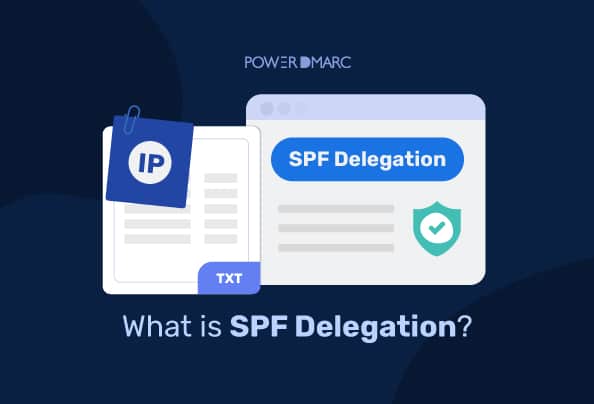Have you heard of the SPF delegation? Maybe not. Seen an SPF TXT record in DNS, maybe? Sounds mysterious. Well, it’s not! Implementing SPF delegation is one of the first steps you should take with your SPF records. An SPF record is an entry in your DNS records that allows someone looking up your domain to see a list of mail servers authorized to send emails.
You’ll hear in this blog post all about SPF and why you might want to go ahead and delegate your DNS record to make life easier for yourself.
Key Takeaways
- SPF delegation is essential for efficiently managing email deliverability while reducing the risk of email bounces due to server issues.
- Implementing SPF delegation helps organizations avoid exceeding the SPF lookup limit, which is crucial for maintaining compliance with email authentication standards.
- Reducing the number of associated IP addresses through SPF delegation aids in preventing spoofing and phishing attacks.
- Delegating SPF management responsibilities to specialized third parties allows companies to focus on their core business activities.
- Utilizing SPF delegation can help organizations avoid potential fines linked to noncompliance with email regulations.
What Is SPF Delegation?
SPF delegation allows you to use your domain name as your address.
Configuring your domain’s SPF record may include the server’s IP address that hosts your website. This is usually fine, but if the server hosting your website goes down, all emails sent to that domain will bounce back to the sender and look bad for both parties.
SPF delegations are used with other authentication mechanisms. For example, DKIM uses SPF delegations so people can send messages from email addresses that don’t belong to them. For instance, from their ISP’s mail server or their company’s mail server — without being rejected as spam by receiving mail servers when those messages bounce back undelivered due to a mismatch between the sender’s email address and the From header in their message.
SPF allows you to delegate this responsibility to another server and specify its IP address (or list of IP addresses) in a special TXT record at the top of your DNS zone file. If someone tries to email one of your subdomains, they’ll get a soft fail instead of a hard fail because they’re not sending it directly to the right place.
Simplify SPF Delegation with PowerDMARC!
Why Delegating Your SPF Records Is Important?
Avoid the SPF Lookup Limitation With SPF Delegation
An SPF flattening tool manages SPF delegation. The reject DMARC policy can be reached safely, wisely, and quickly thanks to the SPF delegation. For Enterprise users, SPF delegation is an optional add-on.
SPF records only permit 10 ‘lookups’ to lessen the strain on the email receivers’ side and issues with SPF modifications. It can be challenging for enterprises with extensive infrastructures to avoid exceeding the lookup limit. It can be challenging to stay under the lookup limit when an organization has several sources sending emails on its behalf (payment processors, CRM systems, email marketing campaigns, free project management tools, security solutions, project management time tracker, etc.). Lookup limit concerns are resolved by SPF delegation by automatically condensing the necessary SPF lookups.
Fewer IP Addresses
Delegating your SPF records is beneficial because it allows you to reduce the number of IP addresses associated with your domain by allowing other domains to send an email on behalf of your domain. It also helps prevent spoofing and phishing attacks against your domain since it can be difficult for attackers to spoof domains that are authorized to send mail using their SPF records.
More Focus on Core Competencies
Along with allowing companies to focus on their core competencies, it allows them to delegate SPF management responsibilities to a third party specializing in this area like PowerDMARC. The delegation also helps companies free up time and resources to focus on other business priorities.
Helps in Avoiding Potential Fines and Penalties
Delegating SPF responsibilities also allows companies to avoid fines and penalties associated with noncompliance. For example, suppose your organization does not have a disaster recovery plan but fails to document this information in its annual internal audit report (IAR). In that case, you may receive a fine from regulators for violating regulations.
Final Words
Spf delegation is a great way to extend the reach of an existing SPF record and protect valuable domains. Regardless of your site’s size—or type—this is a useful tactic that can help you keep spammers out and deliver a better overall experience for your legitimate users.
You may end your concerns about the SPF lookup counter issue and multiple SPF records once you have delegated the SPF records. SPF flattening tools can prevent SPF lookup failure by compressing your information and helping you enjoy automated DNS updates from a single interface with real-time monitoring.
Only the list of permitted IP addresses needs to be provided; the team will take care of establishing the SPF records and compressing them as necessary.
- GoDaddy’s Default DMARC Policy Shift – What It Means for Your Domain Security - September 11, 2025
- What Is IPS? Definition, Types, and How It Works - September 8, 2025
- T-Online Now Enforces Strict DKIM Alignment: What You Need to Know - September 2, 2025
